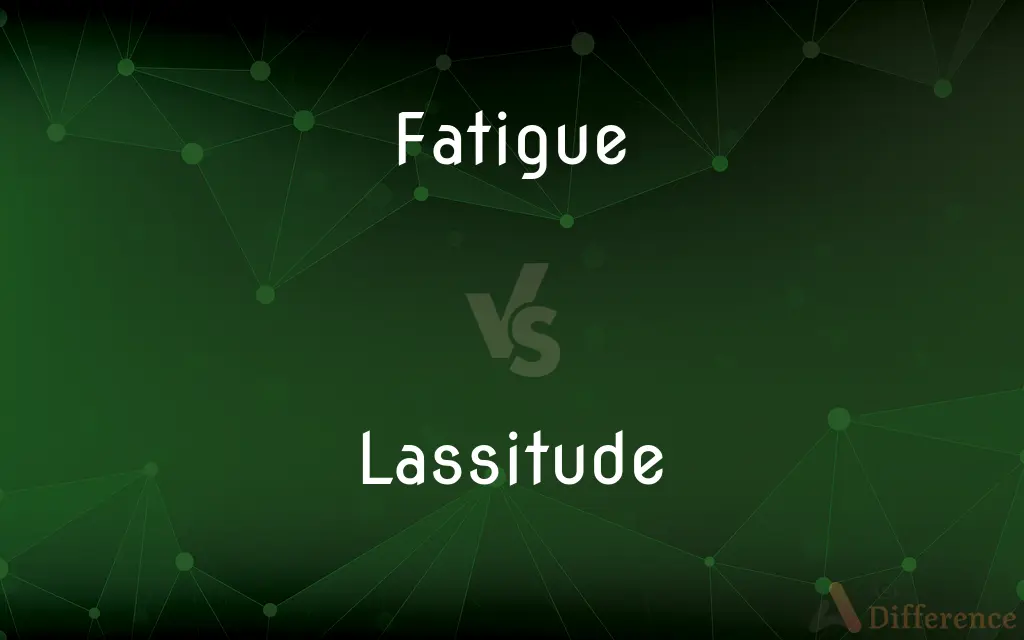Fatigue vs. Lassitude — What's the Difference?
By Tayyaba Rehman & Urooj Arif — Updated on April 3, 2024
Fatigue is a state of physical or mental exhaustion, while lassitude is a feeling of weariness or lack of energy, often without a clear cause.

Difference Between Fatigue and Lassitude
Table of Contents
ADVERTISEMENT
Key Differences
Fatigue often results from physical exertion, mental stress, or lack of sleep, manifesting as a tangible tiredness that can be directly linked to specific activities or conditions. Lassitude, on the other hand, refers to a more generalized feeling of tiredness or lethargy that isn't necessarily the result of overwork or lack of rest; it may arise without an identifiable cause.
While fatigue can usually be alleviated by addressing its underlying causes, such as getting more rest or reducing stress, lassitude can be more persistent and less responsive to such interventions. This difference highlights the more elusive nature of lassitude, which can be symptomatic of underlying health issues or psychological conditions.
Fatigue is a common experience that everyone encounters at some point, often resolved with rest and recovery. Lassitude, however, might indicate a deeper issue, such as chronic fatigue syndrome, depression, or other medical conditions, requiring professional evaluation and treatment.
In terms of symptoms, fatigue is characterized by a decrease in physical and/or mental stamina that impairs normal functioning, whereas lassitude is often accompanied by a lack of motivation or interest in activities, even in the absence of physical tiredness.
Managing fatigue involves practical steps like improving sleep habits, managing stress, and balancing activity with rest. Addressing lassitude may involve a more comprehensive approach, including medical assessment to uncover any underlying conditions, psychological support, and lifestyle adjustments.
ADVERTISEMENT
Comparison Chart
Definition
Physical or mental exhaustion due to exertion or stress.
A state of weariness or lack of energy, often without clear cause.
Causes
Overwork, stress, lack of sleep.
May not have an identifiable cause; can be symptom of underlying condition.
Resolution
Rest, stress management, sleep.
May require medical evaluation and treatment.
Symptoms
Decreased stamina, impaired functioning.
Lack of motivation, interest, even without physical tiredness.
Commonality
A universal experience, often easily resolved.
Can indicate deeper health issues, less commonly understood.
Management
Practical lifestyle changes.
Comprehensive approach including medical and psychological assessment.
Compare with Definitions
Fatigue
A temporary decrease in physical and mental performance due to overexertion.
Continuous work without breaks led to significant fatigue.
Lassitude
A state of physical or mental weariness; lack of energy.
Her lassitude made it hard to get out of bed in the morning.
Fatigue
The state of being extremely tired, physically or mentally.
After the marathon, she experienced extreme fatigue.
Lassitude
Lack of enthusiasm or energy to do anything.
He felt a sense of lassitude at the thought of another day at work.
Fatigue
Weariness from bodily or mental exertion.
The fatigue from studying all night was overwhelming.
Lassitude
A symptom that may require medical attention to address underlying causes.
His lassitude was eventually diagnosed as a symptom of thyroid dysfunction.
Fatigue
The condition of feeling exhausted by effort; fatigue can be alleviated with rest.
The doctor recommended more rest to combat his fatigue.
Lassitude
Persistent tiredness not relieved by rest.
Despite a full night's sleep, she woke up with a feeling of lassitude.
Fatigue
A symptom of diseases or conditions, improving with treatment.
Fatigue is a common symptom of flu.
Lassitude
A condition often associated with depression or chronic conditions.
Lassitude can be a debilitating aspect of chronic fatigue syndrome.
Fatigue
Fatigue is a feeling of tiredness. It may be sudden or gradual in onset.
Lassitude
A state or feeling of weariness, diminished energy, or listlessness.
Fatigue
Physical or mental weariness resulting from effort or activity.
Lassitude
Lethargy or lack of energy; fatigue.
Fatigue
Something, such as tiring effort or activity, that causes tiredness or weariness
The fatigue of a long hike.
Lassitude
Listlessness or languor.
Fatigue
(Physiology) The decreased capacity or complete inability of an organism, organ, or part to function normally because of excessive stimulation or prolonged exertion.
Lassitude
A condition of the body, or mind, when its voluntary functions are performed with difficulty, and only by a strong exertion of the will; languor; debility; weariness.
The corporeal instruments of action being strained to a high pitch . . . will soon feel a lassitude.
Fatigue
The weakening or failure of a material, such as metal or wood, resulting from prolonged stress.
Lassitude
A state of comatose torpor (as found in sleeping sickness)
Fatigue
Manual or menial labor, such as barracks cleaning, assigned to soldiers.
Lassitude
A feeling of lack of interest or energy
Fatigue
Fatigues Clothing worn by military personnel for labor or for field duty.
Lassitude
Weakness characterized by a lack of vitality or energy
Fatigue
To tire out; exhaust.
Fatigue
To create fatigue in (a metal or other material).
Fatigue
To be or become tired.
Fatigue
A weariness caused by exertion; exhaustion.
Fatigue
(often in the plural) A menial task or tasks, especially in the military.
Fatigue
(engineering) Weakening and eventual failure of material, typically by cracking leading to complete separation, caused by repeated application of mechanical stress to the material.
Fatigue
(transitive) To tire or make weary by physical or mental exertion.
Fatigue
To wilt a salad by dressing or tossing it.
Fatigue
(intransitive) To lose so much strength or energy that one becomes tired, weary, feeble or exhausted.
Fatigue
To undergo the process of fatigue; to fail as a result of fatigue.
Fatigue
To cause to undergo the process of fatigue.
The repeated pressurization cycles fatigued the airplane's metal skin until it eventually broke up in flight.
Fatigue
Weariness from bodily labor or mental exertion; lassitude or exhaustion of strength.
Fatigue
The cause of weariness; labor; toil; as, the fatigues of war.
Fatigue
The weakening of a metal when subjected to repeated vibrations or strains.
Fatigue
To weary with labor or any bodily or mental exertion; to harass with toil; to exhaust the strength or endurance of; to tire.
Fatigue
Temporary loss of strength and energy resulting from hard physical or mental work;
He was hospitalized for extreme fatigue
Growing fatigue was apparent from the decline in the execution of their athletic skills
Weariness overcame her after twelve hours and she fell asleep
Fatigue
Used of materials (especially metals) in a weakened state caused by long stress;
Metal fatigue
Fatigue
(always used with a modifier) boredom resulting from overexposure to something;
He was suffering from museum fatigue
After watching TV with her husband she had a bad case of football fatigue
The American public is experiencing scandal fatigue
Political fatigue
Fatigue
Labor of a nonmilitary kind done by soldiers (cleaning or digging or draining or so on);
The soldiers were put on fatigue to teach them a lesson
They were assigned to kitchen fatigues
Fatigue
Get tired of something or somebody
Fatigue
Exhaust or tire through overuse or great strain or stress;
We wore ourselves out on this hike
Common Curiosities
What should I do if I’m experiencing persistent lassitude?
It's important to consult a healthcare provider for a thorough evaluation to identify any underlying causes and appropriate treatment.
Can lassitude be a symptom of a serious condition?
Yes, lassitude can be indicative of underlying health issues such as depression, chronic fatigue syndrome, or other medical conditions.
Can changing my lifestyle improve feelings of lassitude?
While lifestyle changes can help, understanding and addressing the root cause is crucial due to lassitude's often complex origins.
How can I tell if I’m experiencing lassitude or just tiredness?
Lassitude is characterized by a lack of motivation and energy without a clear cause and persists even with adequate rest, unlike typical tiredness which resolves with rest.
Can both fatigue and lassitude be present at the same time?
Yes, an individual can experience both conditions simultaneously, especially in cases of chronic health issues.
Are there treatments specifically for lassitude?
Treatment depends on its underlying cause; it might involve medication, therapy, lifestyle changes, or a combination of these.
What role does diet play in managing fatigue and lassitude?
A balanced diet can support energy levels and overall health, potentially mitigating fatigue and improving well-being, which may indirectly affect lassitude.
Is it normal to feel fatigue regularly?
Occasional fatigue is normal, especially after exertion or due to lack of sleep, but regular or chronic fatigue warrants a closer look at lifestyle or health.
What is the main difference between fatigue and lassitude?
The main difference lies in their causes and resolution; fatigue is often the result of physical or mental exertion and can be resolved with rest, while lassitude may not have a clear cause and can be more persistent.
Is mental health related to feelings of lassitude?
Yes, mental health conditions like depression are commonly associated with lassitude.
How do healthcare professionals diagnose lassitude?
Diagnosis may involve medical history, physical exams, and tests to rule out other conditions and identify any underlying issues.
Can exercise help with fatigue and lassitude?
Regular, moderate exercise can boost energy levels and improve mood, which may help alleviate symptoms of both fatigue and lassitude.
Share Your Discovery

Previous Comparison
Dutch vs. Danish
Next Comparison
Condor vs. EagleAuthor Spotlight
Written by
Tayyaba RehmanTayyaba Rehman is a distinguished writer, currently serving as a primary contributor to askdifference.com. As a researcher in semantics and etymology, Tayyaba's passion for the complexity of languages and their distinctions has found a perfect home on the platform. Tayyaba delves into the intricacies of language, distinguishing between commonly confused words and phrases, thereby providing clarity for readers worldwide.
Co-written by
Urooj ArifUrooj is a skilled content writer at Ask Difference, known for her exceptional ability to simplify complex topics into engaging and informative content. With a passion for research and a flair for clear, concise writing, she consistently delivers articles that resonate with our diverse audience.












































